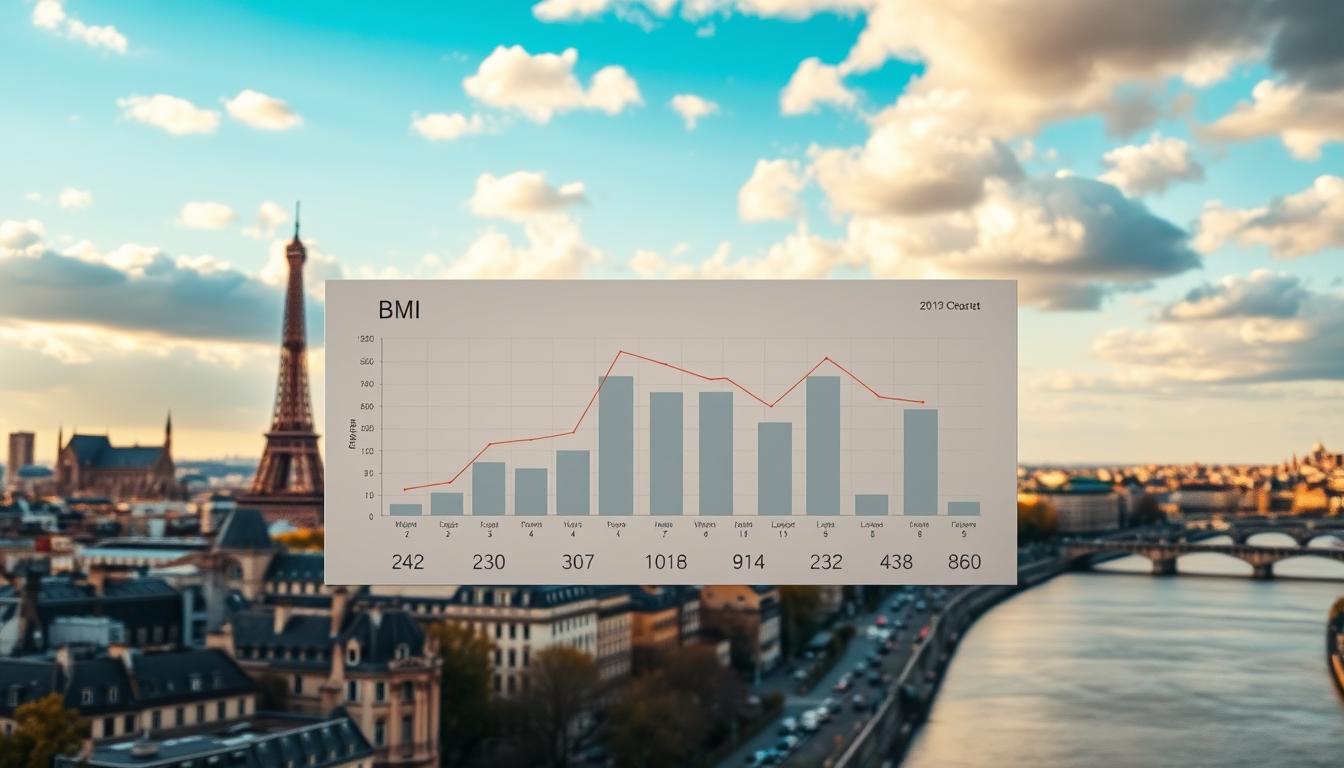Ever thought about how your body size stacks up against global standards, in a city like Paris? The Body Mass Index (BMI) is a key tool for health checks. It’s interesting to see how it fits for people in or visiting this famous city.
We’ll look into why BMI matters for health checks. Knowing your BMI helps you see what affects your health, in a place like Paris.
Key Takeaways
- Understanding the concept of BMI and its global relevance.
- Exploring how lifestyle factors in Paris influence BMI.
- Learning how to assess your health using the BMI metric.
- Discovering the significance of BMI in health assessments.
- Understanding the role of BMI in maintaining overall wellness.
Understanding the BMI Chart: An Overview
To understand BMI, it’s key to know what the BMI chart shows. The BMI chart is a simple tool. It sorts people into weight categories based on their body mass index.
What is BMI and Why Does it Matter?
BMI, or Body Mass Index, is a formula based on weight and height. It’s important because it shows if a person has a healthy weight for their height. This helps spot risks of weight-related health issues.
We use a BMI calculator France to find our BMI. Knowing our BMI category, as shown on Paris charts, helps us see health risks tied to our weight.
How is BMI Calculated?
BMI is found by dividing weight in kilograms by height in meters squared. For instance, if someone weighs 70 kilograms and is 1.75 meters tall, their BMI is calculated as follows:
BMI = 70 kg / (1.75 m)^2 = 22.86. This number is then used on a BMI chart to find the BMI categories Paris.

Knowing how to calculate and understand BMI helps us check our health. It guides us in making better lifestyle choices.
Importance of BMI in Health Assessment
BMI is a key tool in health checks. It shows if a person’s weight is healthy for their height. It’s a first step to see if weight issues need medical help.
The Role of BMI in Identifying Weight Issues
The Body Mass Index (BMI) helps sort people into weight groups. These groups are underweight, normal weight, overweight, and obese. This sorting is key to spotting health risks linked to being too thin or too heavy.
A high BMI might mean a higher chance of heart disease, diabetes, and some cancers. On the other hand, a low BMI could point to malnutrition or other health problems. Doctors use BMI to catch these risks early and help prevent them.
| BMI Category | BMI Range | Health Risks |
|---|---|---|
| Underweight | Less than 18.5 | Malnutrition, osteoporosis |
| Normal weight | 18.5 – 24.9 | Low risk |
| Overweight | 25 – 29.9 | Increased risk of heart disease, diabetes |
| Obese | 30 or greater | High risk of heart disease, diabetes, certain cancers |
Limitations of BMI as a Health Indicator
BMI is useful but has its limits. For instance, it doesn’t measure body fat directly. Someone with a lot of muscle might have a high BMI without health risks. A study on the National Center for Biotechnology Information says BMI should be checked with other health metrics for a better picture.
Also, BMI might not work for everyone, like athletes or people from different ethnic groups. So, while BMI is helpful, it should be used with other health checks for a full view of health.

The BMI Chart: How to Read It
A BMI chart is a simple tool to understand your body mass index and its health implications. It categorizes people into weight groups based on BMI, which is calculated from height and weight.
Interpreting BMI Values
To understand your BMI, you need to know the World Health Organization’s categories. A study in PLOS ONE shows BMI is a key indicator of health risks related to weight.
Here are the standard BMI categories:
- Underweight: BMI is less than 18.5
- Normal weight: BMI is 18.5 to 24.9
- Pre-obesity: BMI is 25 to 29.9
- Obesity class I: BMI is 30 to 34.9
- Obesity class II: BMI is 35 to 39.9
- Obesity class III: BMI is 40 or greater
Understanding BMI Categories
Knowing these categories is key to understanding your weight status and health risks. A BMI of 18.5 to 24.9 is generally normal. A BMI of 30 or higher is obese. An ideal weight calculator Paris can help find your ideal weight based on height and other factors.
Let’s look at an example:
| BMI Category | BMI Range | Health Risk |
|---|---|---|
| Underweight | < 18.5 | Malnutrition risk |
| Normal weight | 18.5 – 24.9 | Low risk |
| Pre-obesity | 25 – 29.9 | Enhanced risk |
To better understand these categories, look at a BMI chart or infographic. It shows BMI ranges and health risks. 
Knowing your BMI and its category is the first step to managing your weight and health risks. Always consult a healthcare professional for personalized advice on your weight and health.
BMI Trends: Insights from Paris
Exploring Paris’s health trends gives us a unique look at BMI. The city’s mix of traditional food, modern diets, and health views is intriguing. It’s a great case study.
How Paris’ Lifestyle Affects BMI
The Parisian way of life balances old French food and new eating styles. Dietary habits are key in shaping BMI. The city’s focus on fresh food, bread, and cheese can lead to both good and bad eating.
The city’s fast pace, cultural events, and walking habits also shape physical activity. Active commuting and fun activities help Parisians burn energy.
Recent Studies on BMI in Parisian Populations
Recent studies have uncovered BMI trends in Paris. Epidemiological research links BMI to social status. Some areas have higher obesity rates.
These findings stress the need for targeted health efforts. They aim to even out health chances across different social groups in Paris.
Personalizing Your Health Journey
Personalizing your health journey is more than knowing your BMI. It’s about setting achievable goals and getting professional advice when needed. Understanding our current health status is key. A BMI calculator France can offer valuable insights into our health.
Setting Realistic Weight Goals
Setting realistic weight goals is a crucial step towards a healthy weight. A healthy weight is not just a number on the scale. It’s about overall health. A healthy weight chart France can help find our ideal weight range.
When setting weight goals, consider age, gender, and body composition. Aim for slow weight loss for better sustainability. Getting advice from a healthcare professional can be very helpful.
When to Consult a Healthcare Professional
Knowing when to see a healthcare professional is important. If you’re having trouble reaching your weight goals or have health concerns, it’s wise to seek advice.
Here’s a simple guide to help you understand when to seek professional help:
| Health Indicator | Normal Range | When to Seek Help |
|---|---|---|
| BMI | 18.5 – 24.9 | Below 18.5 or above 24.9 |
| Blood Pressure | 90/60 – 120/80 mmHg | Outside this range consistently |
| Weight Loss | Gradual loss of 1-2 pounds/week | Rapid loss or gain |
Visual aids can also help in understanding health metrics. For instance, a BMI chart can visually represent different BMI categories.
By understanding our health status and setting realistic goals, we can start a successful health journey. Remember, personalizing your health journey is about making informed decisions and seeking advice when needed.
Visual Representation: Infographics of BMI Data
Infographics help us understand BMI data better. They make complex information simple. This way, we can easily see our BMI category and health risks.
BMI Chart for Adults
The BMI chart for adults sorts people into weight categories. These include underweight, normal weight, overweight, and obese. Knowing these categories helps us see health risks tied to different BMI levels.
| BMI Category | BMI Range | Health Risk |
|---|---|---|
| Underweight | Less than 18.5 | Malnutrition risk |
| Normal weight | 18.5 – 24.9 | Low risk |
| Overweight | 25 – 29.9 | Enhanced risk |
| Obese | 30 or greater | High risk |
“BMI is a simple, yet effective tool for assessing weight status and health risks.”
BMI Chart for Kids and Teens
For kids and teens, BMI is different. It considers age and sex. The BMI chart for this age group helps assess their weight status.
- Underweight: BMI-for-age
- Normal weight: BMI-for-age = 5th percentile to
- Overweight: BMI-for-age = 85th percentile to
- Obese: BMI-for-age ≥ 95th percentile
Using these charts helps parents and doctors spot weight issues early. They can then take the right steps.
Conclusion: Embracing a Healthy Lifestyle in Paris
Understanding our BMI is just the start. In Paris, lifestyle and nutrition are key to health. Eating well and staying active are essential.
France’s healthy eating policies help its people stay well. This shows how important good habits are for everyone.
Nutritional Balance
Being healthy is more than just checking BMI. It’s about living a balanced life. Using an Ideal weight calculator Paris can help tailor health plans.
Further Resources
For more on BMI and health, check out health websites. Also, talking to healthcare experts is very helpful. Making smart choices can lead to a better life.


